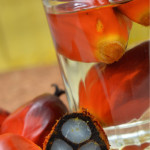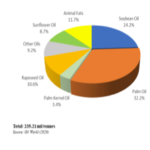India’s Edible Oil Imports ‘Excessive’?
Indian trade and industry bodies such as the Solvent Extractors Association (SEA) and Soybean Processors Association (SOPA) have shed copious tears for domestic oilseed growers and made shrill noises against the ‘excessive’ import of edible oil.
The associations have from time to time demanded that the government should immediately hike the Customs duty on imported oils (read: palm oil) rather steeply, or create a larger differential between refined and unrefined oils so as to ‘save’ oilseed farmers.
How valid are these recommendations and is there justification for the associations to say what they are saying? Before examining the merits of the patently self-serving recommendations, let us look at some background data. India’s oil year runs from November of one year to October of the following year.
We are now talking about oil year 2015-16. Vegetable oil imports in July 2016 (the latest available at the time of writing) were recorded at 1.12 million tonnes. In the last nine months – November 2015 to July 2016 – imported oil arrivals were 10.8 million tonnes, marginally up from 10.2 million tonnes during the corresponding period in the previous year.
Projected imports for the entire oil year 2015-16 are about 13 million tonnes, valued at about Rs 60,000 crores (about US$9.3 billion). This will be less than the aggregate imports for oil year 2014-15 at 14.4 million tonnes, valued at approximately Rs 65,000 crores (US$10 billion). In 2013-14, the import volume aggregated 11.8 million tonnes. The numbers are really big.
Without doubt, palm oil dominates India’s import basket, and why not? It is most economically priced and well accepted by consumers. Additionally, origin to destination transit time is short.
Over the last several months, in unison, the SEA and SOPA and possibly many others have alleged that India is being used as a dumping ground for unloading the excess supplies in the world market.
‘This has put tremendous pressure on local prices’, they complain, as well as assert that current prices are at levels where Indian farmers are in distress and losing interest in the oilseed crop. This is far from true as evidenced by the following data.
What the numbers show
As at Aug 26, Kharif oilseed planting for the 2016-17 season was 17.8 million ha, higher compared to 17.4 million ha last year and the previous year’s acreage of 17.2 million ha. Are growers losing interest in oilseeds? Far from true; the numbers do not lie.
Look at another set of numbers. Vegetable oil stocks at port and in pipeline are currently estimated to total over 1.6 million tonnes. According to the SEA, India’s monthly requirement of edible oil is 1.6 million tonnes which translates to total annual consumption demand of 19.2 million tonnes.
How the demand estimate is derived is anybody’s guess. The apex body, the Central Organisation for Oil Industry and Trade, has estimated domestic production in 2015-16 at 7.2 million tonnes, unchanged from the previous year.
In the light of these data, I find the representations for a steep hike in duty or for creating wider duty differential between unrefined and refined oils as somewhat amusing and a joke on consumers.
It is unclear what constitutes ‘excessive’ imports. One is not sure if the trade bodies have any benchmark for ‘normal’ and ‘excessive’ imports. Is there a cut-off point to decide if the import volume is normal? As public bodies, the associations owe us an explanation.
Again, there is nothing new in the demand of the trade bodies that seeks a hike in Customs duty on imports. They have been routinely complaining about excessive imports for many years; but who cares?
The associations want the government to raise import duty; and policy makers have, by and large, remained unmoved. It is possible that the government’s priorities are not in sync with trade demands; alternatively it may be that the trade has not been able to convince or make out a strong-enough justifiable case for a duty hike.
When self-discipline is absent
But I want to come from another angle. Why do these large national-level bodies (some proclaim themselves as premier associations) that claim to enjoy clout in the corridors of power (the claim is highly suspect, though) want the government to do everything or solve every problem of the trade and industry, including the so-called excessive imports? What have these bodies done to put their own house in order or ‘discipline’ their members?
Come to think of it, all vegetable oil importers – certainly the big boys and everyone knows who they are – are members of these associations. What has prevented the associations and their enlightened leadership from talking to these big boys and directing them to reduce imports ‘in order to save the Indian oilseed farmer’? One is not sure if the leadership of these trade bodies has thought of this step or even has the courage to propose such a move.
Indeed, I have reason to believe, senior officials in New Delhi pose the same question to the delegations of these associations seeking a duty hike. ‘What have you done as a trade association to reduce/regulate imports or to discipline your members?’
Clearly, in the concerned ministries in New Delhi, no important functionary is ready to take representations for a duty hike seriously. Sure, the officials will be polite to delegations that visit; but the outcome is something all of us know well.
Domestic stock-piling
The tragedy is this: it stands to reason to believe that India is becoming a dumping ground for palm oil. A part of our imports is merely stock transfer from origin to destination; and we have in this country a few accomplices to play along with overseas suppliers.
Importantly, there is a massive amount of stock building in the country in anticipation of a duty hike, in the hope that policy makers will at some stage succumb to pressure brought on by the trade bodies. If the duty is hiked, it is these speculative interests who will win and reap windfall gains. It is possible that the associations are being guided from behind by these speculative interests.
Importantly again, one does not hear noises against undesirable and wholly avoidable trade practices. Take for instance, the long credit period importers enjoy. The period of 90-150 days is exploited to the hilt to create an unending chain of imports and payments.
Many of the importers here are actually falling into an ‘import debt trap’. Hypothetically, if edible oil imports on credit are stopped today, most importers will face a deep payment crisis; some may go bust.
Last but not the least, it is sad that trade bodies try to extract favours from the government by talking about farmers or using their name. Farmers know to look after themselves and policy makers know how to look after the farmers.
Trade associations must ask themselves what they have done for farmers’ welfare or whether they have done enough.
G Chandrashekhar
Global Agribusiness and Commodity Sector Specialist
India










Leave a Reply